Menu of Internationalization Activities
Societās can assist higher education institutions in exploring, defining and making the most of what internationalization has to offer. Below are frameworks of services, programs or initiatives that can enhance international engagement. Those in white have more information.

Academic
Curriculum Internationalization
Definition: Incorporation of global, intercultural perspectives into course content, learning outcomes, and teaching methods to prepare students for global challenges.
Benefits: Enhances global competence, promotes critical thinking, and aligns with workforce needs.
Impacts: Strengthens academic programs, supports European internationalization goals, and fosters inclusive education.
Country Related: Widespread Practice (Key focus in Europe)
Dual Degree Programs
Definition: Academic programs enabling students to earn degrees from two institutions in different countries, often on an accelerated timeline, fostering deep academic and cultural collaboration.
Benefits: Provides diverse academic perspectives, enhances global employability through dual credentials, and promotes intercultural competence.
Impacts: Strengthens institutional partnerships, increases global visibility, and drives cross-border academic innovation.
Country Related: Widespread International Practice
English Language Institute
Definition: Programs offering intensive English language training for non-native speakers, serving as a pathway to academic integration with tailored language support and cultural orientation.
Benefits: Improves academic success, enhances communication skills, and fosters social integration for international students.
Impacts: Attracts diverse student populations, supports internationalization goals, and strengthens institutional reputation in Anglophone countries.
Country Related: Global (Prominent in Anglophone nations)
Epistemic Decolonization through ‘Re-Centering Africa’ Curricula
Definition: Curricular reform replacing Eurocentric canons with African epistemologies, texts, and perspectives, as seen at the University of Cape Town.
Benefits: Promotes cultural pride, enhances relevance, and fosters inclusive education.
Impacts: Advances decolonization, strengthens African identity, and influences global curricular reforms.
Country Related: South Africa
Global Citizenship Education
Definition: Courses emphasizing ethical global engagement, social responsibility, and sustainable development to prepare students for global contributions.
Benefits: Fosters ethical leadership, enhances global awareness, and promotes sustainability.
Impacts: Aligns with global development goals, strengthens civic engagement, and supports internationalization.
Country Related: Widespread International Practice
Global Competency Development
Definition: Training equipping staff and students with skills for international engagement, enhancing readiness.
Benefits: Improves skills, promotes collaboration, and fosters cultural competence.
Impacts: Strengthens institutional capacity, supports global education, and elevates preparedness.
Country Related: Widespread International Practice
Global Education Minors/Certificates
Definition: Interdisciplinary programs offering minors or certificates in global education, focusing on social theories and comparative frameworks to address global issues.
Benefits: Prepares students for global careers, enhances intercultural skills, and promotes ethical global engagement.
Impacts: Aligns with U.S. liberal arts traditions, strengthens global curricula, and supports institutional internationalization.
Country Related: United States
Global Experiential Learning Modules
Definition: Short, intensive modules combining virtual and in-person international experiences to develop practical global skills, e.g., Université Laval’s programs.
Benefits: Enhances practical skills, promotes flexibility, and reduces mobility costs.
Impacts: Expands access to global learning, strengthens Canadian experiential education, and fosters innovation.
Country Related: International Practice (e.g., Canada)
Global Learning Certificates
Definition: Credentials recognizing completion of globally focused coursework or activities, validating intercultural competence.
Benefits: Enhances resumes, promotes global skills, and supports career advancement.
Impacts: Strengthens institutional offerings, promotes global competence, and aligns with workforce demands.
Country Related: Widespread International Practice
Intercultural Learning
Definition: Educational activities fostering understanding of cultural differences through collaborative projects or diverse content.
Benefits: Promotes empathy, enhances collaboration, and supports inclusivity.
Impacts: Strengthens global curricula, fosters diverse learning environments, and supports internationalization at home.
Country Related: Widespread International Practice
International Micro-Credentials
Definition: Short-term, internationally recognized certifications earned through cross-border courses, enhancing mobility and employability.
Benefits: Improves flexibility, promotes global recognition, and boosts career prospects.
Impacts: Strengthens global education systems, supports mobility, and aligns with workforce needs.
Country Related: Widespread International Practice
International Teaching Fellowships
Definition: Programs sending faculty to teach abroad for extended periods, e.g., Freie Universität Berlin’s exchanges.
Benefits: Enriches teaching, fosters global collaboration, and enhances expertise.
Impacts: Strengthens German academic networks, supports mobility, and elevates institutional reputation.
Country Related: International Practice (e.g., Germany)
International University Classrooms
Definition: Campus-based learning environments incorporating global content and diverse student interactions to simulate international settings.
Benefits: Enhances global awareness, promotes inclusivity, and fosters collaboration.
Impacts: Strengthens campus diversity, supports internationalization at home, and prepares students for global workforce.
Country Related: Widespread International Practice
Internationalized Assessment Methods
Definition: Assessments incorporating global perspectives or requiring intercultural problem-solving to evaluate students’ global competence.
Benefits: Enhances critical thinking, promotes global awareness, and aligns with learning outcomes.
Impacts: Strengthens academic rigor, supports internationalization goals, and fosters innovative evaluation.
Country Related: Widespread International Practice
Internationalized Co-Curricular Activities
Definition: Campus events like global speaker series or cultural workshops complementing academic learning with global themes.
Benefits: Enhances engagement, promotes cultural exchange, and fosters community.
Impacts: Strengthens campus diversity, supports internationalization, and enriches student experience.
Country Related: Widespread International Practice
Joint Degree Programs
Definition: Collaborative programs where multiple institutions jointly award a single degree, integrating international curricula and faculty expertise for global relevance.
Benefits: Enhances academic rigor, provides globally recognized credentials, and fosters cross-cultural collaboration.
Impacts: Strengthens institutional alliances, promotes research synergies, and boosts global competitiveness.
Country Related: Widespread International Practice
Mirror Classes
Definition: Virtual classroom interactions between students and professors from different countries, exploring topics from varied perspectives.
Benefits: Enhances global collaboration, promotes cultural exchange, and reduces costs.
Impacts: Strengthens virtual education, fosters global connectivity, and supports internationalization.
Country Related: Widespread International Practice
Multilingual Curriculum Development
Definition: Designing courses offered in multiple languages to attract diverse students and enhance accessibility, e.g., Universidad Complutense de Madrid’s bilingual programs.
Benefits: Promotes inclusivity, enhances linguistic skills, and boosts enrollment.
Impacts: Strengthens Spain’s global education appeal, supports diversity, and fosters innovation.
Country Related: International Practice (e.g., Spain)
President’s Award for Global Learning
Definition: University initiatives funding interdisciplinary student and faculty teams to address real-world global challenges in international contexts.
Benefits: Develops practical global skills, fosters teamwork, and enhances problem-solving abilities.
Impacts: Elevates institutional prestige, promotes community engagement, and aligns with U.S. experiential learning priorities.
Country Related: United States
Promotion of African Languages as Medium of Instruction
Definition: Delivering degree programs or courses in indigenous African languages (e.g., Kiswahili, Yoruba, Zulu) to advance linguistic heritage and decolonize education.
Benefits: Preserves cultural identity, enhances accessibility, and promotes inclusivity.
Impacts: Advances decolonization, strengthens African education systems, and fosters regional pride.
Country Related: e.g., Tanzania, Nigeria, South Africa
Transnational Education Programs
Definition: Degree programs delivered across borders through partnerships, enabling students to earn foreign credentials while studying in their home country.
Benefits: Increases educational access, enhances employability, and promotes cross-cultural understanding.
Impacts: Strengthens global education networks, supports economic development, and aligns with internationalization strategies.
Country Related: Global (Prominent with UK, Australian, U.S. providers)
Trilingual Programs
Definition: Courses fostering proficiency in three languages to enhance global communication and academic engagement in multilingual environments.
Benefits: Improves linguistic versatility, enhances career prospects, and fosters cultural empathy.
Impacts: Supports regional multilingualism, strengthens academic diversity, and promotes global connectivity.
Country Related: Regions with multilingual contexts (e.g., Europe, Africa, Asia)
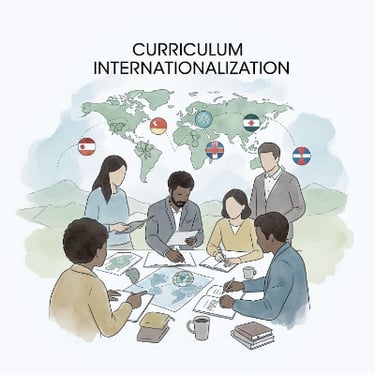

This list provides a comprehensive overview of initiatives and programs designed to advance global engagement in higher education. Organized into sections covering Academic, Capacity Building, Institutional Services, Internationalization at Home, Mobility, and Research, it offers detailed definitions, benefits, impacts, and regional contexts for each activity. This resource serves as a guide for educators, administrators, and policymakers seeking to understand and implement internationalization strategies in academic institutions worldwide.
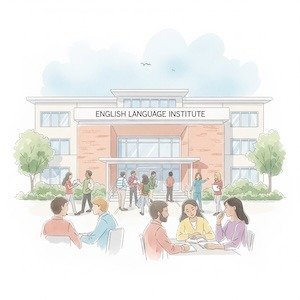



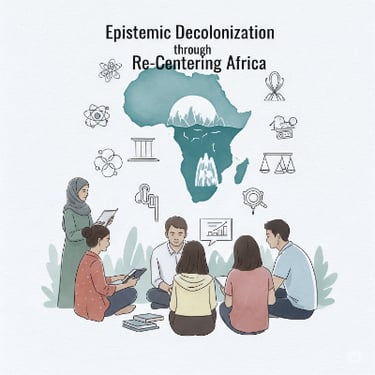

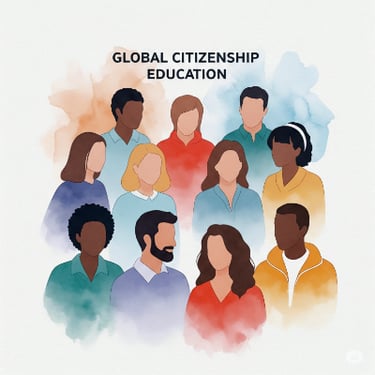



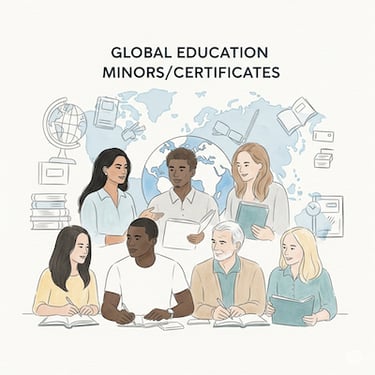

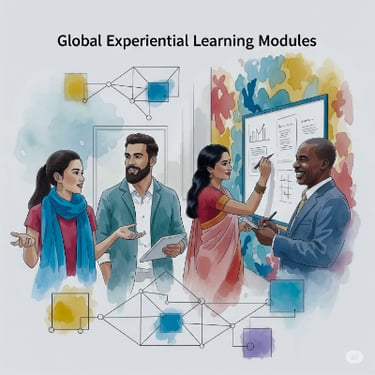





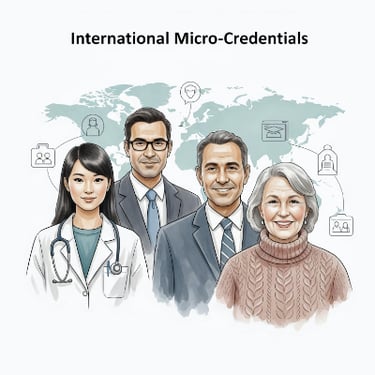





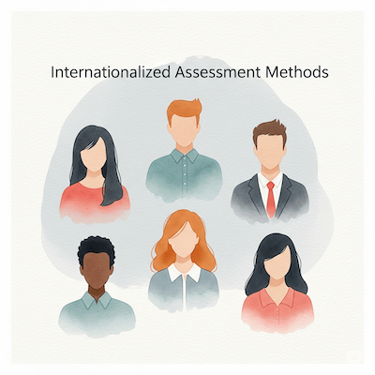

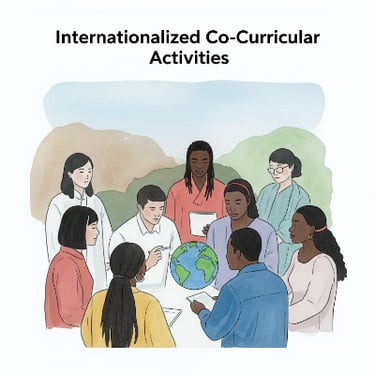





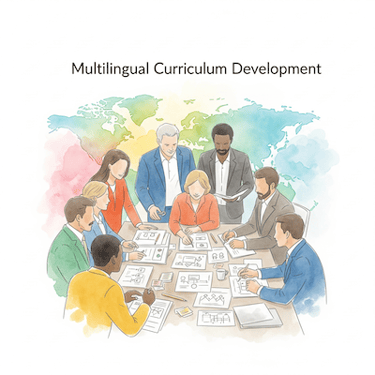

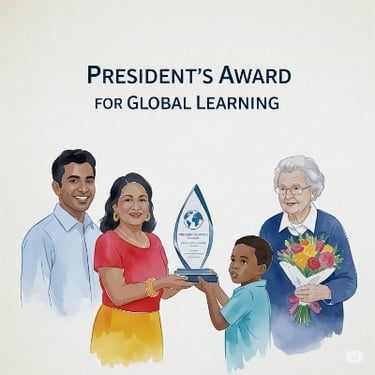





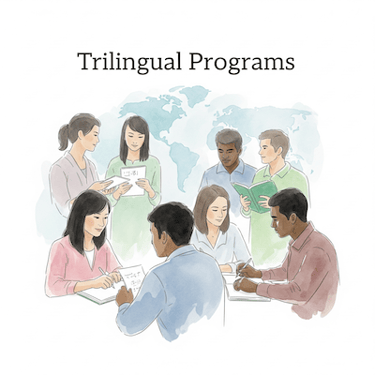

Research
African Research Universities Alliance Centers of Excellence
Definition: Thematic research hubs hosted at member universities to conduct collaborative research on African challenges, such as climate change, food security, and public health.
Benefits: Promotes high-impact research, enhances regional collaboration, and addresses local challenges.
Impacts: Elevates African research capacity, supports continental development, and strengthens global research networks.
Country Related: Pan-African
Campus-in-Campus (CiC) Initiatives
Definition: Deep partnerships where universities share campuses and functions for joint curricula and research, as seen in Japan.
Benefits: Enhances collaboration, promotes shared resources, and fosters academic integration.
Impacts: Strengthens global academic ties, supports innovation, and elevates institutional reach.
Country Related: Japan
Cátedras for Regional Integration Studies
Definition: Endowed academic chairs dedicated to studying Latin American integration, history, and culture, fostering regional identity.
Benefits: Advances regional scholarship, promotes cultural unity, and enhances academic collaboration.
Impacts: Strengthens Latin American identity, supports regional integration, and elevates research output.
Country Related: Latin America
Collaborative Doctoral Partnerships
Definition: Doctoral programs enabling students to work with multiple institutions across borders, often leading to dual degrees.
Benefits: Enhances research training, promotes global collaboration, and boosts career prospects.
Impacts: Strengthens academic partnerships, supports research innovation, and elevates global research output.
Country Related: Widespread International Practice
Cross-Border Data Sharing Initiatives
Definition: Programs enabling secure sharing of research data across global institutions to enhance collaborative research outcomes.
Benefits: Facilitates large-scale research, promotes transparency, and enhances data-driven insights.
Impacts: Improves research quality, supports global collaboration, and accelerates innovation.
Country Related: Widespread International Practice
Cross-Border Research Ethics Training
Definition: Training ensuring ethical standards in multinational research projects, promoting responsible research practices.
Benefits: Enhances research integrity, fosters trust, and ensures compliance.
Impacts: Strengthens global research standards, supports ethical collaboration, and elevates trust in research outcomes.
Country Related: Widespread International Practice
Cross-National Research Policy Dialogues
Definition: Forums where researchers and policymakers from multiple countries discuss research priorities, e.g., UNESCO’s dialogues.
Benefits: Aligns research with global needs, fosters collaboration, and informs policy.
Impacts: Strengthens science-policy linkages, supports global priorities, and enhances research impact.
Country Related: Global / Supranational
Data Libraries
Definition: Repositories sharing datasets from multiple countries, supporting global research and teaching initiatives.
Benefits: Enhances data access, promotes collaboration, and supports innovation.
Impacts: Strengthens research capacity, fosters global knowledge sharing, and supports data-driven education.
Country Related: Widespread International Practice
Global Academic Dissemination
Definition: Sharing research through international conferences, journals, and platforms to reach global audiences and enhance visibility.
Benefits: Increases research impact, fosters collaboration, and elevates recognition.
Impacts: Strengthens global knowledge exchange, supports academic reputation, and promotes innovation.
Country Related: Widespread International Practice
Global Innovation Challenges
Definition: Competitions encouraging researchers to develop solutions for global issues with international collaborators, fostering innovation.
Benefits: Promotes problem-solving, enhances collaboration, and boosts visibility.
Impacts: Drives global innovation, strengthens research networks, and addresses societal challenges.
Country Related: Widespread International Practice
Global Research Incubators
Definition: Collaborative platforms fostering early-stage international research projects, addressing global challenges with multi-institutional support.
Benefits: Enhances innovation, promotes resource sharing, and supports scalability.
Impacts: Strengthens global research ecosystems, fosters collaboration, and drives impactful solutions.
Country Related: Widespread International Practice
Global University Network Participation
Definition: Engagement in global university networks to scale innovative education models and share resources.
Benefits: Enhances collaboration, promotes innovation, and fosters resource sharing.
Impacts: Strengthens global education networks, supports scalability, and elevates institutional impact.
Country Related: Widespread International Practice
Integration of Indigenous Knowledge Systems (IKS) into Research
Definition: Formal centers and initiatives validating and incorporating local and indigenous knowledge into scientific research, particularly in agriculture, medicine, and environmental science.
Benefits: Enhances research relevance, promotes inclusivity, and preserves cultural heritage.
Impacts: Advances decolonized knowledge, strengthens local solutions, and influences global research paradigms.
Country Related: Pan-African
Interdisciplinary STEM Research Collaborations
Definition: Programs fostering collaboration across STEM disciplines to address complex global challenges, often supported by U.S. initiatives.
Benefits: Promotes innovation, enhances problem-solving, and fosters interdisciplinary synergy.
Impacts: Drives technological advancements, strengthens U.S. research leadership, and addresses global issues.
Country Related: United States
International Conferences
Definition: Events hosted by universities to facilitate global knowledge exchange and networking among researchers worldwide.
Benefits: Enhances collaboration, promotes visibility, and fosters innovation.
Impacts: Strengthens global research networks, elevates institutional reputation, and supports knowledge dissemination.
Country Related: Widespread International Practice
International Open Access Repositories
Definition: Platforms enabling global access to research outputs, promoting open science and collaboration.
Benefits: Enhances knowledge sharing, promotes equity, and supports research impact.
Impacts: Strengthens global research access, fosters open science, and supports innovation.
Country Related: Widespread International Practice
International Patenting
Definition: Processes securing patents across countries for university innovations, enhancing global commercialization.
Benefits: Protects intellectual property, promotes commercialization, and boosts revenue.
Impacts: Enhances innovation ecosystems, supports global competitiveness, and drives economic impact.
Country Related: Widespread International Practice
International Publications
Definition: Publishing research in global journals or co-authoring cross-cultural studies to enhance visibility and impact.
Benefits: Increases visibility, fosters collaboration, and enhances research impact.
Impacts: Strengthens global academic networks, supports knowledge exchange, and elevates institutional reputation.
Country Related: Widespread International Practice
International Research Capacity Training
Definition: Workshops training researchers in developing countries to participate in global research networks, enhancing skills and access.
Benefits: Builds expertise, promotes equity, and enhances collaboration.
Impacts: Strengthens global research capacity, supports North-South engagement, and fosters inclusivity.
Country Related: Global / Development
International Research Collaboration
Definition: Partnerships across countries to conduct joint research, enhancing global impact and scope.
Benefits: Enhances research quality, promotes resource sharing, and fosters innovation.
Impacts: Strengthens global research networks, addresses shared challenges, and elevates institutional outcomes.
Country Related: Widespread International Practice
International Research Consortia
Definition: Formal alliances among institutions to collaborate on large-scale research projects addressing global challenges.
Benefits: Enhances scalability, promotes resource sharing, and fosters innovation.
Impacts: Drives high-impact research, strengthens global collaboration, and supports societal progress.
Country Related: Widespread International Practice
International Research Impact Assessments
Definition: Evaluations measuring global societal impact of collaborative research, e.g., German Research Foundation’s frameworks.
Benefits: Enhances accountability, informs funding, and promotes impact-driven research.
Impacts: Strengthens research evaluation, aligns with global priorities, and elevates German research influence.
Country Related: International Practice (e.g., Germany)
International Research Mentorship Programs
Definition: Initiatives pairing early-career researchers with global mentors for career development and guidance.
Benefits: Enhances skills, fosters networking, and supports career growth.
Impacts: Strengthens global research capacity, promotes mentorship, and supports emerging talent.
Country Related: Widespread International Practice
International Research Networks
Definition: Alliances connecting researchers globally to collaborate on shared challenges, fostering networks and expertise.
Benefits: Enhances collaboration, promotes knowledge sharing, and supports innovation.
Impacts: Strengthens global research ecosystems, supports scientific progress, and addresses global issues.
Country Related: Widespread International Practice
International Research Structures
Definition: Global research units or centers fostering collaborative projects and training programs with international partners.
Benefits: Enhances research capacity, promotes collaboration, and fosters scalability.
Impacts: Strengthens global research infrastructure, supports innovation, and drives societal impact.
Country Related: Widespread International Practice
International Research Symposia
Definition: Regular academic events focusing on global issues, bringing together researchers to share findings and build partnerships.
Benefits: Enhances networking, promotes knowledge exchange, and fosters collaboration.
Impacts: Strengthens global research networks, elevates institutional visibility, and supports innovation.
Country Related: Widespread International Practice
Joint Research Programs
Definition: Collaborative research initiatives involving multiple universities targeting specific global challenges, pooling expertise.
Benefits: Enhances research quality, promotes resource sharing, and fosters innovation.
Impacts: Strengthens global partnerships, enhances research impact, and addresses societal issues.
Country Related: Widespread International Practice
Regional Thematic Networks for Research Capacity Building
Definition: Large-scale consortia of universities focused on specific challenges, like RUFORUM, sharing graduate programs and research.
Benefits: Enhances research capacity, promotes regional collaboration, and addresses local priorities.
Impacts: Strengthens African academic networks, supports development goals, and elevates research impact.
Country Related: Pan-African
Technology Transfer
Definition: Transferring academic research outcomes to international industries for societal benefit, enhancing commercialization.
Benefits: Promotes economic growth, enhances innovation, and fosters industry partnerships.
Impacts: Strengthens global innovation ecosystems, supports economic impact, and elevates research relevance.
Country Related: Widespread International Practice
Transnational Social Science Research Networks (CLACSO Model)
Definition: Collaborative working groups coordinated by a regional body (e.g., CLACSO) to study critical social issues from a regional perspective.
Benefits: Enhances research relevance, promotes collaboration, and impacts social policy.
Impacts: Strengthens Latin American research networks, supports regional advocacy, and addresses societal challenges.
Country Related: Latin America & Caribbean
University-Hosted Innovation & Entrepreneurship Hubs
Definition: Tech hubs (e.g., i-hubs) providing mentorship and resources for student startups, enhancing employability.
Benefits: Promotes innovation, fosters entrepreneurship, and enhances career paths.
Impacts: Strengthens African innovation ecosystems, supports economic growth, and elevates graduate outcomes.
Country Related: e.g., Kenya, Nigeria, Ghana, Rwanda
Virtual Collaboration Projects
Definition: Online group projects connecting students across borders to work on shared academic or research tasks, fostering global teamwork.
Benefits: Enhances


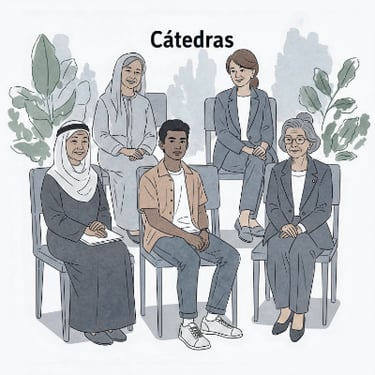

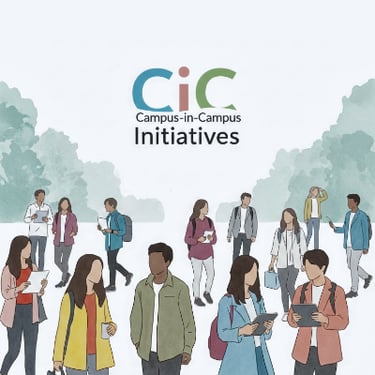



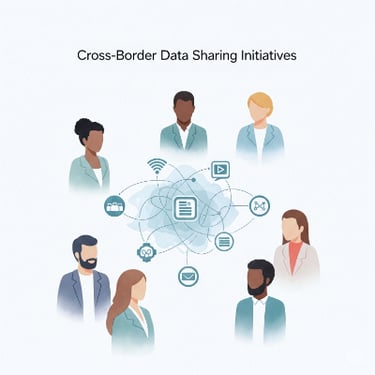







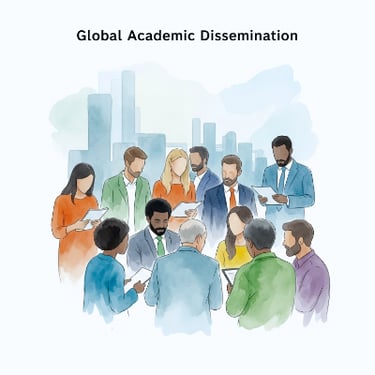

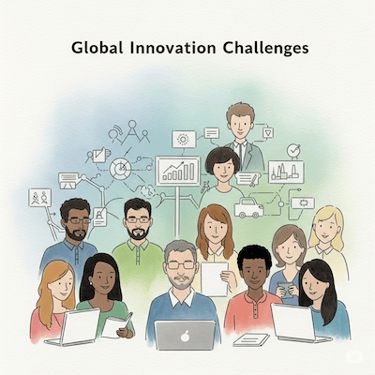



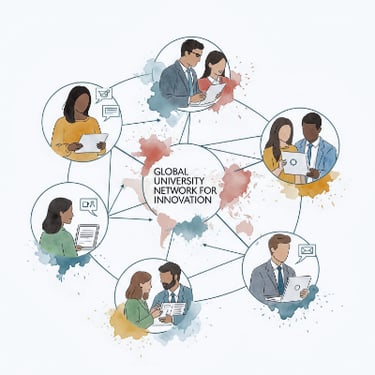

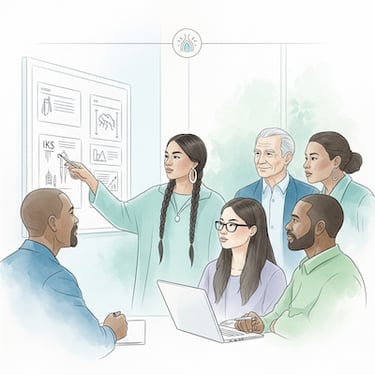





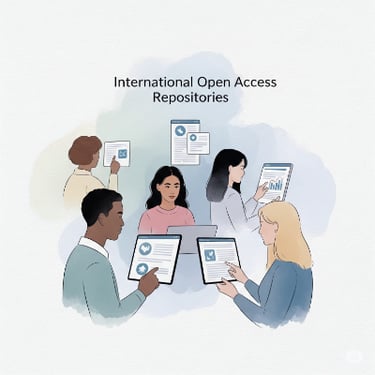









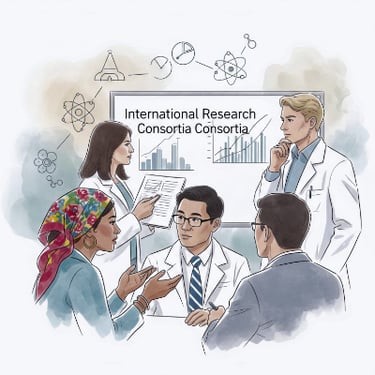



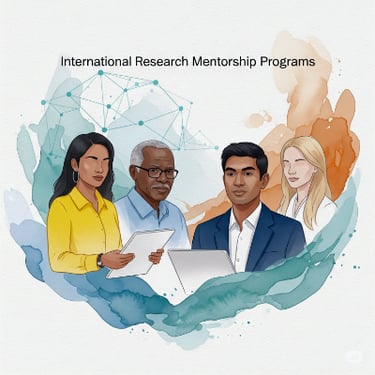

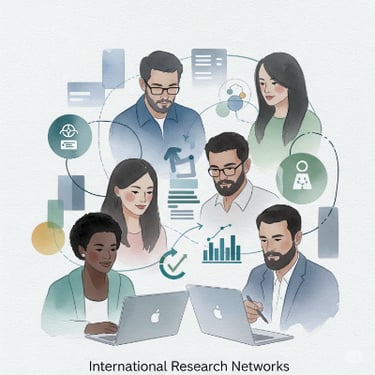

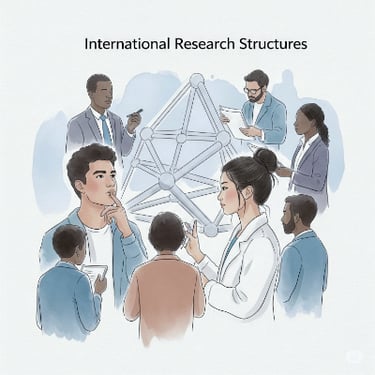





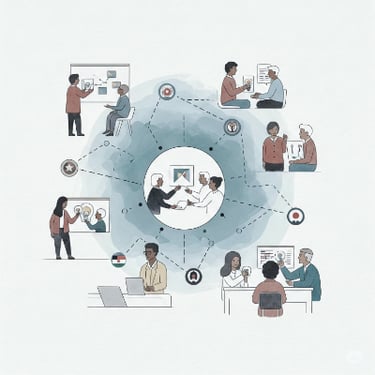



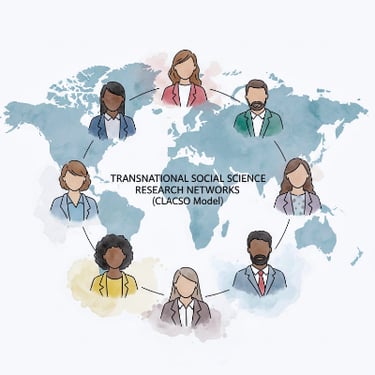





Mobility (Global Learning)
Administrative Staff Shadowing Programs
Definition: Cross-institutional visits for staff to learn international practices, enhancing administrative global competence.
Benefits: Improves operational efficiency, fosters cultural exchange, and enhances professional skills.
Impacts: Strengthens institutional collaboration, supports global administrative standards, and promotes mobility.
Country Related: Widespread International Practice
ASEAN Credit Transfer System (AUN-ACTS) Facilitation
Definition: Utilizing ASEAN’s credit transfer system to promote seamless student mobility and academic recognition within Southeast Asia.
Benefits: Enhances mobility, supports academic integration, and reduces barriers.
Impacts: Strengthens ASEAN academic ties, promotes regional cooperation, and boosts student opportunities.
Country Related: Southeast Asia (ASEAN Nations)
Collaborative Online International Learning (COIL)
Definition: Virtual courses connecting students from different countries for project-based collaboration, enhancing intercultural skills and global teamwork.
Benefits: Develops collaboration skills, promotes cultural exchange, and reduces travel costs.
Impacts: Expands global learning access, strengthens virtual education, and fosters institutional partnerships.
Country Related: Widespread International Practice
Community-Based Experiential Learning for Development
Definition: Programs embedding students in local communities to work on development projects (e.g., public health, agriculture), combining academic learning with societal impact, as pioneered by Makerere University.
Benefits: Enhances practical skills, fosters civic engagement, and promotes sustainable development.
Impacts: Strengthens community ties, supports local development, and aligns with Uganda’s educational priorities.
Country Related: Uganda
Cross-Border Internship Networks
Definition: Networks linking universities with international organizations for global internship opportunities, enhancing practical experience.
Benefits: Improves employability, fosters global networks, and enhances professional skills.
Impacts: Strengthens industry connections, supports student mobility, and elevates institutional reputation.
Country Related: Widespread International Practice
Diaspora-Sponsored Student Scholarships & Exchanges
Definition: Programs funded by a country’s diaspora to facilitate student mobility for specialized training, connecting students with expatriates.
Benefits: Enhances access, fosters cultural ties, and promotes global networks.
Impacts: Strengthens diaspora engagement, supports African talent development, and boosts regional connectivity.
Country Related: e.g., Ethiopia, Nigeria, Ghana
Exchange Programs
Definition: Reciprocal agreements between universities allowing students to study at partner institutions while paying home institution tuition, promoting cultural and academic enrichment.
Benefits: Offers international exposure, builds adaptability, and fosters global connections.
Impacts: Enhances institutional partnerships, diversifies campus communities, and promotes cross-cultural understanding.
Country Related: Widespread International Practice
Faculty Exchange Programs
Definition: Reciprocal arrangements for faculty to teach or research at partner institutions, enhancing global academic perspectives.
Benefits: Enriches teaching, fosters collaboration, and enhances research output.
Impacts: Strengthens global partnerships, supports academic mobility, and elevates institutional expertise.
Country Related: Widespread International Practice
Faculty Mobility
Definition: Initiatives enabling faculty to teach or research abroad, fostering global perspectives and expertise.
Benefits: Enriches academic offerings, promotes collaboration, and enhances professional development.
Impacts: Strengthens global academic networks, supports mobility, and elevates institutional reputation.
Country Related: Widespread International Practice
Faculty-Led Study Tours
Definition: Short-term, faculty-guided international trips combining academic learning with cultural immersion for students.
Benefits: Enhances experiential learning, promotes cultural awareness, and fosters global engagement.
Impacts: Strengthens student mobility, supports global education, and elevates institutional programs.
Country Related: Widespread International Practice
Global Case Study Competitions
Definition: Academic contests where students solve international problems, often involving cross-university collaboration, to develop analytical and teamwork skills.
Benefits: Enhances problem-solving, promotes global collaboration, and boosts employability.
Impacts: Fosters innovation, strengthens global networks, and elevates institutional visibility.
Country Related: Widespread International Practice
Global Learning Communities
Definition: Structured programs fostering collaboration among students from different countries through virtual or in-person networks, promoting intercultural dialogue.
Benefits: Enhances community building, promotes cultural exchange, and develops global networks.
Impacts: Strengthens campus diversity, fosters global connectivity, and supports internationalization goals.
Country Related: Widespread International Practice
International Field Schools
Definition: Immersive programs in foreign locations for hands-on academic or research experiences, enhancing practical learning.
Benefits: Promotes experiential learning, fosters cultural immersion, and enhances skills.
Impacts: Strengthens global education, supports mobility, and elevates institutional offerings.
Country Related: Widespread International Practice
International Field Trips to Global Companies
Definition: Visits to local offices of international companies to provide real-world global exposure and industry insights.
Benefits: Enhances career readiness, promotes industry connections, and fosters global awareness.
Impacts: Strengthens industry partnerships, supports experiential learning, and elevates institutional reputation.
Country Related: Widespread International Practice
International Volunteer Placements
Definition: Programs placing students or staff in international volunteer roles tied to development projects, enhancing global engagement.
Benefits: Promotes civic engagement, fosters cultural understanding, and enhances skills.
Impacts: Strengthens global community ties, supports development goals, and elevates institutional impact.
Country Related: Widespread International Practice
Internship Programs
Definition: International work placements for students to gain practical experience, enhancing career readiness.
Benefits: Improves employability, fosters global networks, and enhances professional skills.
Impacts: Strengthens industry ties, supports student mobility, and elevates institutional reputation.
Country Related: Widespread International Practice
Language & Culture Pedagogy Programs for Foreign Students
Definition: Taiwan’s programs funding student immersion in language and culture, alongside teacher exchanges, to enhance cultural ties.
Benefits: Promotes cultural exchange, enhances language skills, and fosters partnerships.
Impacts: Strengthens Taiwan’s soft power, supports global education, and boosts cultural diplomacy.
Country Related: Taiwan
Short-Term Faculty Residencies
Definition: Brief international placements for faculty to teach or research, enhancing global perspectives.
Benefits: Enriches teaching, fosters collaboration, and enhances expertise.
Impacts: Strengthens global academic networks, supports mobility, and elevates offerings.
Country Related: Widespread International Practice
Student Co-Op Programs Abroad
Definition: Structured work-study programs placing students in international professional settings, e.g., Universidad de Chile’s initiatives.
Benefits: Enhances employability, fosters practical skills, and promotes global networks.
Impacts: Strengthens industry ties, supports Chilean education, and elevates institutional reputation.
Country Related: International Practice (e.g., Chile)
Student Mobility
Definition: Programs facilitating students’ academic or experiential learning in foreign countries, enhancing global exposure.
Benefits: Promotes cultural awareness, enhances skills, and boosts employability.
Impacts: Strengthens global education, supports mobility, and elevates institutional reputation.
Country Related: Widespread International Practice
Study Abroad
Definition: Programs allowing students to pursue coursework at foreign institutions for a semester or year, offering immersive academic and cultural experiences.
Benefits: Enhances global awareness, builds independence, and improves language skills.
Impacts: Diversifies student perspectives, strengthens global partnerships, and boosts internationalization efforts.
Country Related: Widespread International Practice


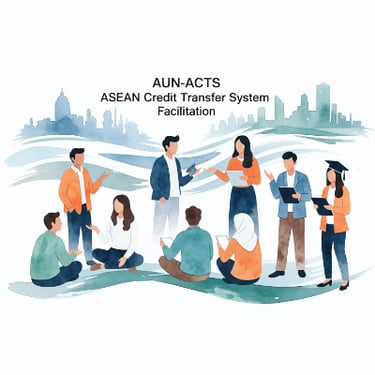













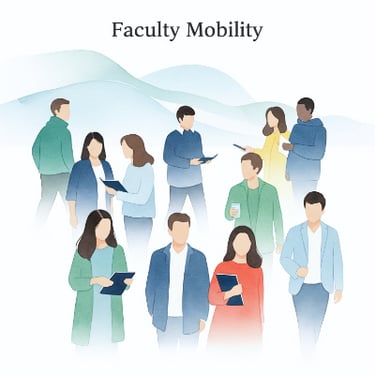

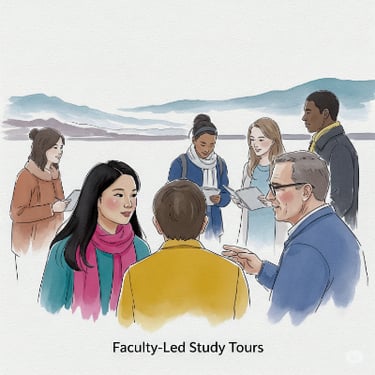



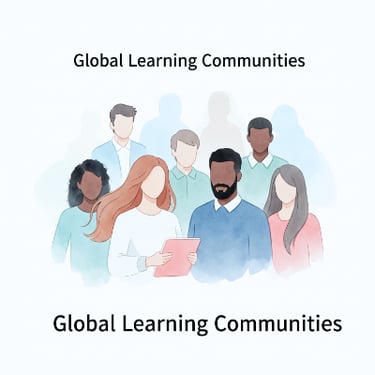

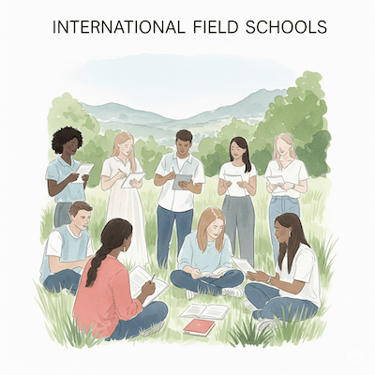







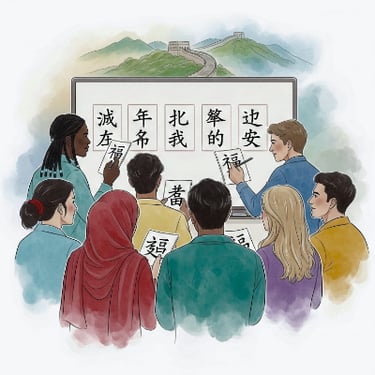



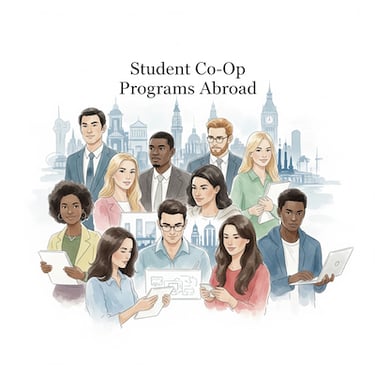

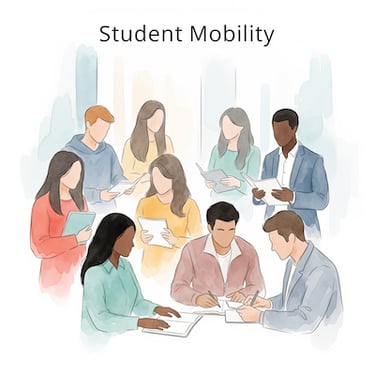

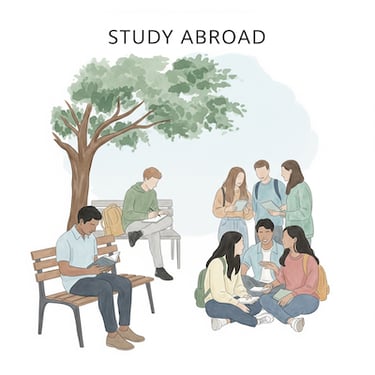

Internationalization at home
AI-Driven Assessment of Intercultural Competence
Definition: AI-powered systems using scenario-based models and sentiment analysis to measure and provide insights into students’ intercultural competence, offering personalized feedback.
Benefits: Enhances self-awareness, improves intercultural skills, and supports tailored learning.
Impacts: Advances educational technology adoption, promotes global competence, and strengthens institutional innovation.
Country Related: Global / Ubiquitous
Awareness Campaigns for Sustainable Mobility
Definition: Workshops and initiatives promoting sustainable travel practices to reduce environmental impact.
Benefits: Raises awareness, promotes sustainability, and encourages responsible behavior.
Impacts: Supports environmental goals, strengthens global education practices, and enhances institutional responsibility.
Country Related: Widespread International Practice
Community Partnerships for SDG Integration
Definition: Collaborations with communities on projects aligned with UN Sustainable Development Goals, fostering societal impact.
Benefits: Promotes sustainability, enhances engagement, and drives social impact.
Impacts: Supports global priorities, strengthens community ties, and elevates institutional reputation.
Country Related: Widespread International Practice
Cross-Cultural Competence Certification Programs
Definition: Formal certifications in intercultural skills, such as those offered by Universität Heidelberg, to enhance global competencies.
Benefits: Improves employability, promotes intercultural collaboration, and supports skill development.
Impacts: Strengthens German education systems, supports global readiness, and boosts institutional credentials.
Country Related: International Practice (e.g., Germany)
Cultural Engagement and Community Building
Definition: Events celebrating diverse cultures to foster campus integration and community cohesion.
Benefits: Promotes inclusivity, enhances engagement, and fosters cultural pride.
Impacts: Strengthens campus diversity, supports internationalization, and enriches student experiences.
Country Related: Widespread International Practice
Diplomacy Lab Programs
Definition: University initiatives where faculty and students research foreign policy challenges identified by the U.S. Department of State, fostering practical global engagement.
Benefits: Develops policy analysis skills, enhances civic engagement, and provides real-world experience.
Impacts: Strengthens U.S. global influence, promotes academic-policy collaboration, and elevates institutional reputation.
Country Related: United States
Diaspora Academic Engagement Programs
Definition: Initiatives leveraging diaspora expertise for lectures, research, and mentorship, fostering collaboration without relocation.
Benefits: Promotes knowledge exchange, strengthens cultural ties, and enhances expertise.
Impacts: Strengthens diaspora academic networks, supports development, and boosts connectivity.
Country Related: Widespread International Practice
Education Hub Strategy (e.g., Dubai Knowledge Village)
Definition: National strategies to establish countries as education hubs, like Dubai’s Global Schoolhouse, attracting global talent.
Benefits: Attracts talent, fosters economic growth, and enhances competitiveness.
Impacts: Boosts UAE’s education sector, supports global education hub status, and elevates institutional partnerships.
Country Related: Dubai, UAE
Global Competence
Definition: Educational initiatives developing skills, attitudes, and behaviors (e.g., adaptability, critical thinking) for thriving in an interconnected world.
Benefits: Enhances employability, fosters resilience, and promotes intercultural understanding.
Impacts: Prepares students for global workforce, strengthens institutional reputation, and supports global connectivity.
Country Related: Widespread International Practice
Guest Lectures by International Scholars/Practitioners
Definition: Inviting international experts to deliver lectures, enriching course content with global perspectives and expertise.
Benefits: Enhances academic quality, promotes global insights, and fosters networking.
Impacts: Strengthens global engagement, elevates institutional reputation, and diversifies curricula.
Country Related: Widespread International Practice
Household Item Reuse Programs for Students
Definition: Systems enabling students to donate household items to incoming international students, promoting reuse and sustainability.
Benefits: Reduces waste, fosters community, and supports sustainability.
Impacts: Strengthens environmental practices, supports student integration, and elevates campus initiatives.
Country Related: Widespread International Practice
Immigration and Visa Assistance
Definition: Support for navigating visa and immigration regulations for students and scholars, enhancing mobility.
Benefits: Reduces barriers, fosters inclusion, and enhances support.
Impacts: Strengthens global mobility, supports enrollment, and elevates institutional care.
Country Related: Widespread International Practice
Inclusive Campus Environment
Definition: Strategies ensuring a welcoming, equitable environment for international students to foster inclusion.
Benefits: Enhances diversity, promotes engagement, and fosters community.
Impacts: Strengthens campus culture, supports internationalization, and elevates student experiences.
Country Related: Widespread International Practice
Intercultural Communication Workshops
Definition: Training for staff and faculty to navigate cross-cultural interactions, enhancing effectiveness.
Benefits: Improves communication, fosters collaboration, and promotes inclusion.
Impacts: Strengthens global competencies, supports diversity, and elevates institutional engagement.
Country Related: Widespread International Practice
Intercultural Competency Programs
Definition: Workshops or courses developing cultural awareness, empathy, and cross-cultural communication skills for diverse environments.
Benefits: Enhances interpersonal skills, promotes inclusivity, and supports collaboration.
Impacts: Strengthens campus diversity, fosters global readiness, and aligns with internationalization goals.
Country Related: Widespread International Practice
Intercultural Simulation Exercises
Definition: Classroom activities simulating cross-cultural scenarios to develop students’ ability to navigate cultural differences effectively.
Benefits: Enhances problem-solving, promotes cultural empathy, and fosters adaptability.
Impacts: Strengthens global competence, supports inclusive education, and aligns with internationalization goals.
Country Related: Widespread International Practice
Leveraging National ‘Cultural Wave’ Phenomena
Definition: Integrating elements of a nation’s popular culture boom (e.g., South Korea’s Hallyu/K-Wave) into recruitment, campus life, and academic programs to attract international students.
Benefits: Enhances appeal, promotes cultural pride, and fosters global engagement.
Impacts: Strengthens soft power, boosts recruitment, and supports South Korea’s global influence.
Country Related: South Korea
Staff Mobility
Definition: Opportunities for administrative staff to work or train internationally, improving global competencies.
Benefits: Enhances operational skills, fosters cultural exchange, and promotes collaboration.
Impacts: Strengthens institutional capacity, supports global standards, and fosters mobility.
Country Related: Widespread International Practice
State-Sponsored Language and Culture Centers (e.g., Confucius Institutes)
Definition: China-funded centers promoting language and culture at partner institutions, enhancing soft power.
Benefits: Promotes cultural exchange, fosters partnerships, and enhances language skills.
Impacts: Strengthens China’s global influence, supports cultural diplomacy, and boosts education ties.
Country Related: China
Student Presentations to International Audiences
Definition: Assignments where students present to international or cross-cultural audiences to enhance global communication skills.
Benefits: Improves public speaking, fosters cultural adaptability, and boosts confidence.
Impacts: Strengthens global competence, supports internationalization, and prepares students for global careers.
Country Related: Widespread International Practice
Support for Scholars at Risk Programs
Definition: Initiatives providing refuge for persecuted academics to continue their work, supporting academic freedom.
Benefits: Promotes human rights, fosters inclusion, and enhances safety.
Impacts: Supports global academic freedom, strengthens institutional values, and elevates impact.
Country Related: Widespread International Practice
University Cooperation for Development
Definition: Partnerships supporting global societal well-being through education and research collaboration.
Benefits: Enhances social impact, fosters collaboration, and promotes sustainability.
Impacts: Supports global development goals, strengthens partnerships, and elevates institutional impact.
Country Related: Widespread International Practice
University Social Commitment through ‘Extensión’ Programs
Definition: University missions engaging in reciprocal community dialogue and social transformation projects focused on human rights, cultural preservation, and equity, as seen in Latin America.
Benefits: Enhances societal impact, fosters civic engagement, and promotes equity.
Impacts: Strengthens community ties, supports regional development, and elevates institutional reputation.
Country Related: Latin America (esp. Argentina, Uruguay)
Welcoming Refugees
Definition: Programs integrating refugees into university communities, recognizing their skills and fostering inclusion.
Benefits: Promotes equity, fosters inclusion, and enhances diversity.
Impacts: Strengthens global social responsibility, supports refugee integration, and elevates institutional values.
Country Related: Widespread International Practice


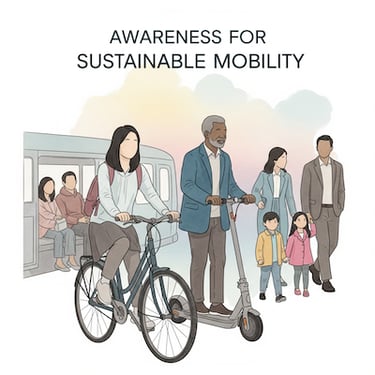

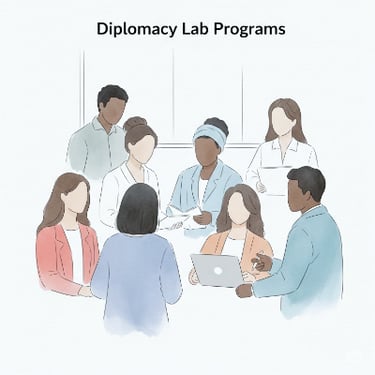





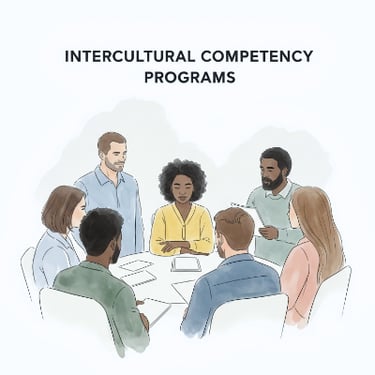

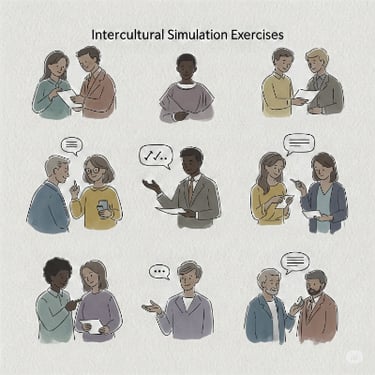





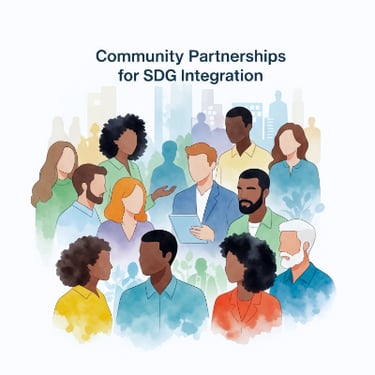

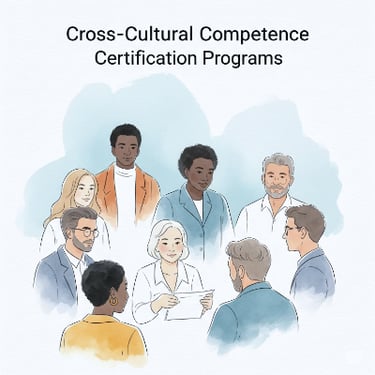



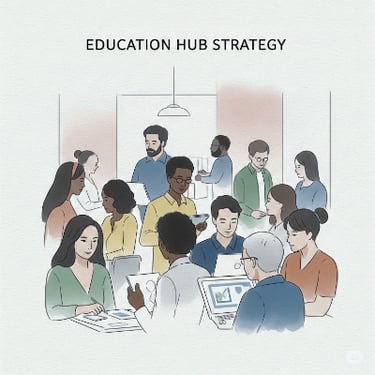

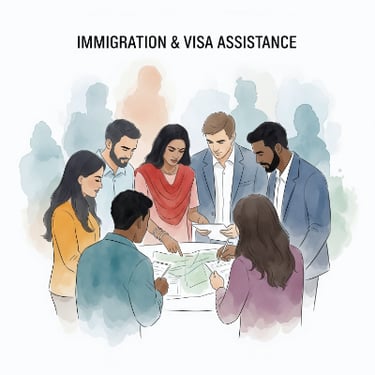

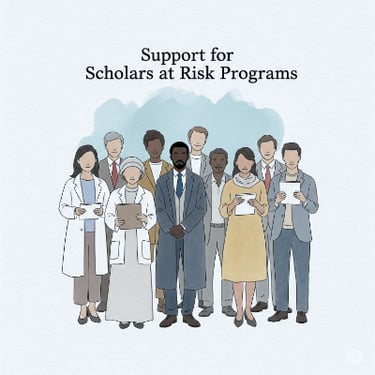





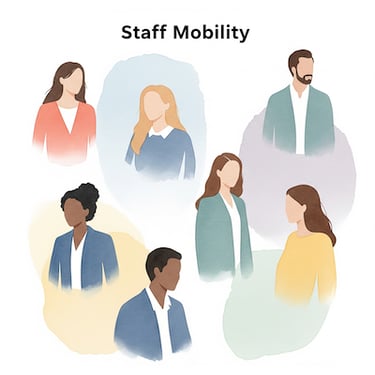











Institutional Services
ACE Internationalization Toolkit Utilization
Definition: Employing ACE’s toolkit for comprehensive internationalization planning, assessment, and institutional development in U.S. institutions, enhancing strategies.
Benefits: Improves strategic planning, fosters benchmarking, and enhances global engagement.
Impacts: Strengthens U.S. institutional capacity, supports best practices, and elevates reputation.
Country Related: United States
AI-Powered Cultural Immersion
Definition: AI-enhanced VR/AR applications simulating foreign cultural settings to foster empathy and understanding without travel.
Benefits: Provides cost-effective cultural exposure, enhances empathy, and supports inclusivity.
Impacts: Reduces travel barriers, promotes sustainable education, and advances technological integration.
Country Related: Global / Ubiquitous
AI-Powered Language Instruction
Definition: AI tools and chatbots (e.g., Duolingo, ChatGPT) for personalized language learning, culturally appropriate dialogues, and etiquette guidance.
Benefits: Accelerates language acquisition, enhances cultural knowledge, and improves accessibility.
Impacts: Democratizes language education, supports global communication, and fosters technological innovation.
Country Related: Global / Ubiquitous
Bilateral and Multilateral Arrangements
Definition: Agreements between institutions in two or more countries to support cooperative research projects, fostering global knowledge exchange.
Benefits: Enhances research quality, promotes resource sharing, and fosters collaboration.
Impacts: Strengthens global research networks, supports innovation, and addresses shared challenges.
Country Related: Widespread International Practice
Career Development Services Partnerships
Definition: Guidance on resumes, internships, and job searches to support international students’ post-graduation success.
Benefits: Enhances employability, promotes networking, and supports career planning.
Impacts: Improves student outcomes, supports global workforce integration, and elevates institutional reputation.
Country Related: Widespread International Practice
Community College Pathway Partnerships
Definition: Collaborations providing pathways for international students to earn degrees via U.S. community colleges, including skill development.
Benefits: Enhances access, promotes academic success, and supports integration.
Impacts: Strengthens U.S. educational appeal, supports diversity, and boosts student opportunities.
Country Related: United States
Comprehensive Advising Services
Definition: Support for international scholars on immigration, employment, and integration issues to foster inclusion.
Benefits: Reduces barriers, enhances services, and promotes inclusivity.
Impacts: Strengthens global academic communities, supports mobility, and elevates student success.
Country Related: Widespread International Practice
Cross-Cultural Pedagogical Training
Definition: Faculty development programs to enhance teaching effectiveness in diverse, multicultural classrooms, focusing on inclusive pedagogies.
Benefits: Improves teaching quality, fosters inclusivity, and enhances student engagement.
Impacts: Strengthens faculty capacity, promotes diverse learning environments, and supports internationalization goals.
Country Related: Widespread International Practice
Curricular Practical Training (CPT)
Definition: U.S.-based programs integrating practical work experience into academic curricula for international students.
Benefits: Enhances career readiness, promotes practical skills, and supports integration.
Impacts: Strengthens U.S. educational appeal, supports student employability, and fosters global connections.
Country Related: United States
Development of Internationalization Toolkits/Resources
Definition: Creation of guides and best practices to support staff in managing global initiatives, enhancing institutional capacity.
Benefits: Improves efficiency, promotes standardization, and fosters collaboration.
Impacts: Strengthens global engagement strategies, supports best practices, and elevates institutional capacity.
Country Related: Widespread International Practice
Digital Internationalization Management Systems
Definition: Digital platforms to manage internationalization activities, e.g., Zhejiang University’s systems in China.
Benefits: Improves efficiency, fosters tracking, and enhances outcomes.
Impacts: Strengthens China’s institutional capacity, supports digital innovation, and elevates reach.
Country Related: China
Digital Recruitment Platforms
Definition: Technology-driven tools, such as virtual fairs, to attract international students and enhance recruitment efficiency.
Benefits: Improves access, promotes diversity, and enhances outreach efforts.
Impacts: Strengthens global enrollment, supports digital innovation, and elevates institutional visibility.
Country Related: Widespread International Practice
Direct Technical Assistance for Internationalization
Definition: Expert guidance to develop internationalization strategies, enhancing program implementation.
Benefits: Improves capacity, fosters best practices, and enhances strategies.
Impacts: Strengthens global engagement, supports institutional growth, and elevates effectiveness.
Country Related: Widespread International Practice
Diversification of International Alliances
Definition: Expanding partnerships across diverse regions to mitigate geopolitical risks and enhance resilience.
Benefits: Balances risks, fosters collaboration, and enhances networks.
Impacts: Strengthens global reach, supports institutional stability, and elevates resilience.
Country Related: Widespread International Practice
Erasmus+ Compliance Systems
Definition: Administrative frameworks ensuring compliance with Erasmus+ quality standards for mobility and partnerships, e.g., KU Leuven’s systems.
Benefits: Ensures quality, fosters collaboration, and enhances mobility.
Impacts: Strengthens European education integration, supports mobility, and elevates standards.
Country Related: Europe
Global Alumni Ambassadorships
Definition: Programs engaging alumni to promote universities internationally, enhancing recruitment and partnerships.
Benefits: Improves global reach, fosters networks, and enhances alumni engagement.
Impacts: Strengthens institutional reputation, supports recruitment, and boosts global connectivity.
Country Related: Widespread International Practice
Global Alumni Mentorship Programs
Definition: Initiatives connecting alumni with students for career and intercultural guidance, fostering mentorship.
Benefits: Enhances career planning, promotes networking, and fosters cultural exchange.
Impacts: Strengthens alumni networks, supports student success, and elevates global engagement.
Country Related: Widespread International Practice
Global Education Recognition Services
Definition: Systems to streamline recognition of international qualifications, e.g., University of Bologna’s credential frameworks, enhancing mobility.
Benefits: Facilitates mobility, promotes recognition, and enhances employability.
Impacts: Strengthens global education integration, supports mobility, and boosts academic recognition.
Country Related: Europe
Global Partnership Management Systems
Definition: Centralized systems to manage international partnerships, e.g., Tecnológico de Monterrey’s platforms, enhancing collaboration.
Benefits: Improves efficiency, fosters partnerships, and enhances tracking.
Impacts: Strengthens global networks, supports collaboration, and elevates Mexico’s institutional capacity.
Country Related: International Practice (e.g., Mexico)
Global Ranking Enhancement Strategies
Definition: Initiatives to improve university rankings through global engagement, such as partnerships and RWTH Aachen’s frameworks.
Benefits: Enhances visibility, competitiveness, and global appeal.
Impacts: Strengthens German institutional reputation, supports rankings, and fosters collaboration.
Country Related: International Practice (e.g., Germany)
Global Reach Task Forces
Definition: Task forces developing strategies to enhance global university presence, aligning with U.S. best practices.
Benefits: Improves strategic focus, fosters collaboration, and enhances reach.
Impacts: Strengthens U.S. global influence, supports internationalization, and elevates reputation.
Country Related: United States
Health and Wellness Services
Definition: Tailored support for international students’ physical and mental health to enhance well-being.
Benefits: Improves student success, fosters inclusion, and enhances support systems.
Impacts: Strengthens student welfare, supports international enrollment, and elevates campus care.
Country Related: Widespread International Practice
Institutional Benchmarking for Internationalization
Definition: Tools to assess and improve internationalization strategies, enhancing institutional performance.
Benefits: Improves strategies, fosters benchmarking, and enhances competitiveness.
Impacts: Strengthens global engagement, supports best practices, and elevates institutional growth.
Country Related: Widespread International Practice
Integration Support
Definition: Programs aiding international students and scholars in adjusting to campus and local communities, enhancing integration.
Benefits: Improves success, fosters inclusion, and enhances support.
Impacts: Strengthens global communities, supports mobility, and elevates institutional care.
Country Related: Widespread International Practice
International Advisory Committees
Definition: Committees aligning international initiatives with institutional goals, as in U.S. universities.
Benefits: Enhances strategic alignment, fosters collaboration, and improves outcomes.
Impacts: Strengthens U.S. internationalization, supports institutional goals, and elevates effectiveness.
Country Related: United States
International Ambassador Programs
Definition: Programs where international students mentor new students, aiding cultural adjustment and integration.
Benefits: Enhances peer support, fosters community, and promotes inclusion.
Impacts: Strengthens U.S. campus diversity, supports student success, and elevates engagement.
Country Related: United States
International Data Analytics
Definition: Use of data analytics to monitor internationalization outcomes, e.g., USP’s strategies in Brazil.
Benefits: Improves decision-making, fosters accountability, and enhances outcomes.
Impacts: Strengthens Brazilian institutional capacity, supports data-driven strategies, and elevates performance.
Country Related: International Practice (e.g., Brazil)
International Liaison Offices
Definition: Offices in strategic regions to support partnerships, recruitment, and alumni networks, enhancing reach.
Benefits: Improves outreach, fosters collaboration, and enhances networks.
Impacts: Strengthens global presence, supports internationalization, and elevates institutional reach.
Country Related: Widespread International Practice
International Risk Management Systems
Definition: Frameworks to mitigate risks in partnerships and mobility, e.g., University of Helsinki’s protocols.
Benefits: Enhances safety, fosters resilience, and improves planning.
Impacts: Strengthens European institutional stability, supports risk management, and elevates trust.
Country Related: Europe
International Student Advisory Boards
Definition: Student-led groups advocating for policies to improve international student experiences, enhancing inclusion.
Benefits: Empowers students, fosters inclusion, and enhances policies.
Impacts: Strengthens student voice, supports international student success, and elevates campus culture.
Country Related: Widespread International Practice
International Student Integration Task Forces
Definition: Dedicated teams developing policies for international student inclusion, such as University de Rennes’ initiatives.
Benefits: Enhances inclusion, improves policies, and fosters engagement.
Impacts: Strengthens French institutional support, supports diversity, and elevates student success.
Country Related: International Practice (e.g., France)
International Student Recruitment Systems
Definition: Systems to streamline international student recruitment, e.g., Fudan’s platforms in China.
Benefits: Improves efficiency, fosters diversity, and enhances enrollment.
Impacts: Strengthens China’s global enrollment, supports internationalization, and elevates institutional reach.
Country Related: China
International Travel Impact Reporting
Definition: Systems to track the environmental impact of international travel by faculty, staff, and students.
Benefits: Promotes sustainability, enhances accountability, and fosters awareness.
Impacts: Supports environmental goals, strengthens sustainable practices, and elevates institutional responsibility.
Country Related: Widespread International Practice
Internationalization Policy Advocacy
Definition: Engagement with global bodies to shape internationalization policies, enhancing influence.
Benefits: Improves policy alignment, fosters collaboration, and enhances impact.
Impacts: Strengthens global education systems, supports advocacy, and elevates institutional influence.
Country Related: Widespread International Practice
Internationalization Strategy Development
Definition: Creation of plans to prioritize global engagement, e.g., Qatar University’s strategic plans.
Benefits: Enhances focus, fosters collaboration, and improves outcomes.
Impacts: Strengthens Qatar’s global education presence, supports internationalization, and elevates reputation.
Country Related: International Practice (e.g., Qatar)
Intra-African Credit Transfer & Harmonization Systems
Definition: Regional frameworks like the African Credit Transfer System to facilitate student mobility and recognition across African institutions.
Benefits: Enhances mobility, promotes integration, and reduces barriers.
Impacts: Strengthens African education systems, supports continental unity, and boosts opportunities.
Country Related: Africa-wide
North-South Collaborations
Definition: Partnerships between institutions in developed and developing countries to promote equity and knowledge exchange in research.
Benefits: Enhances equity, fosters collaboration, and addresses local needs.
Impacts: Strengthens global research inclus


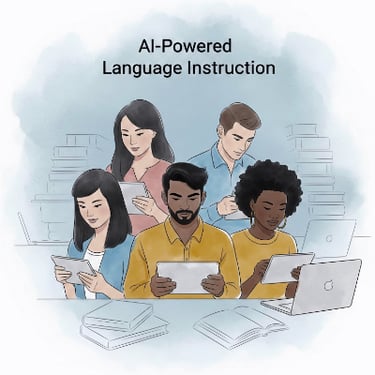



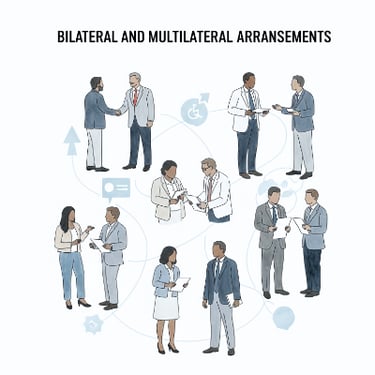





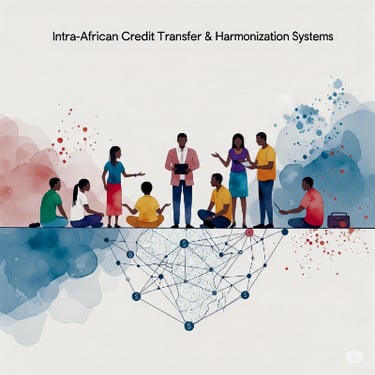



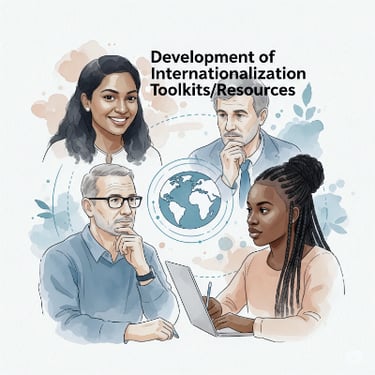

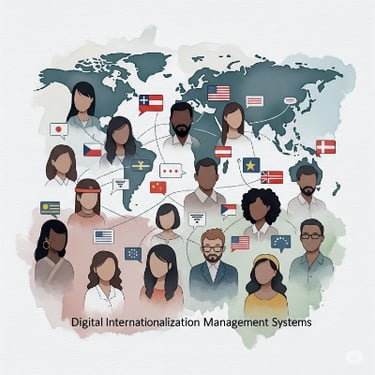







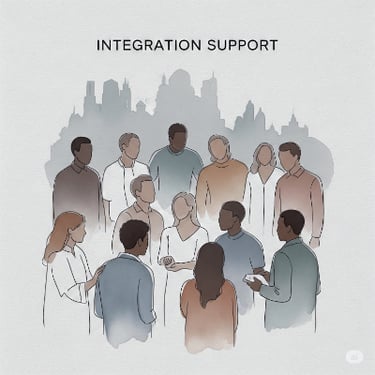

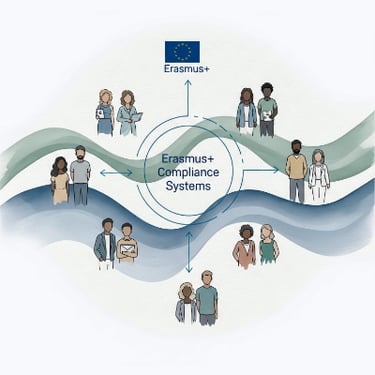

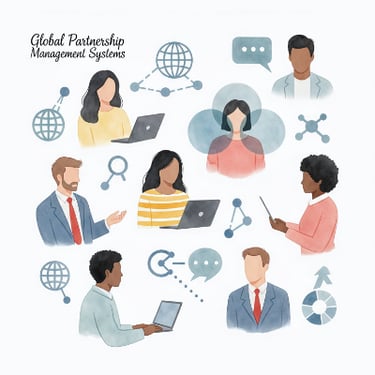

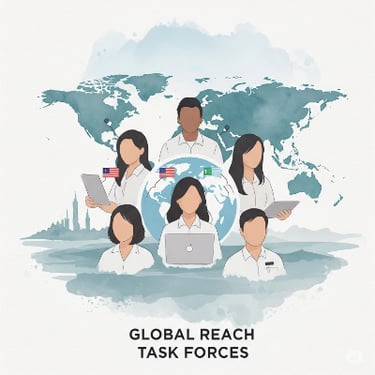

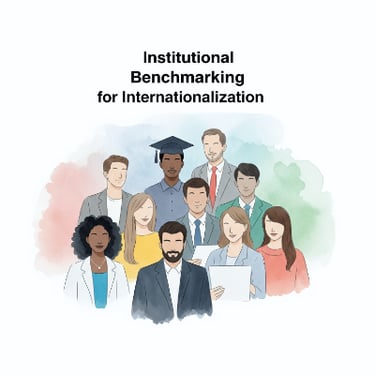

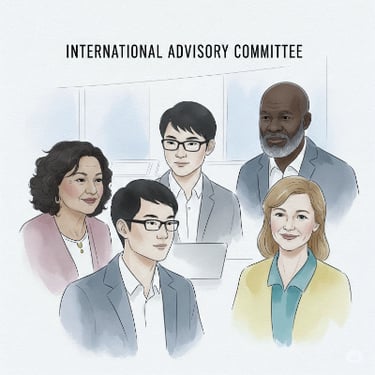



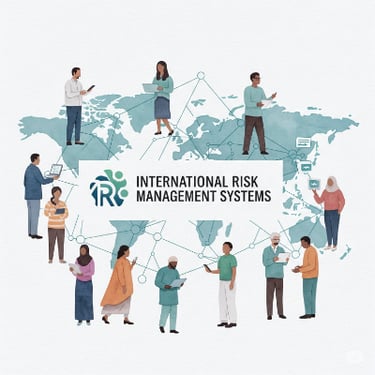

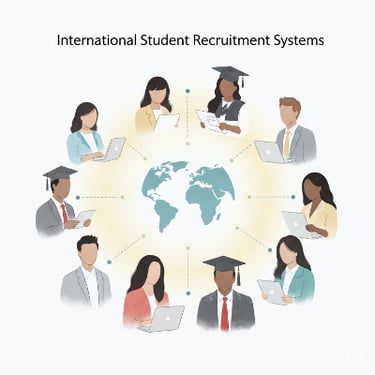

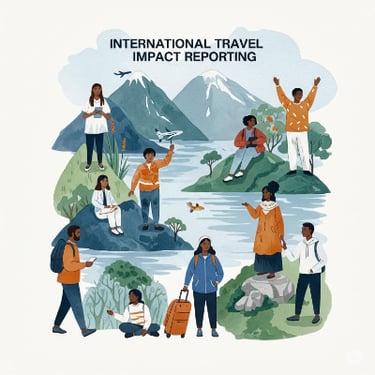

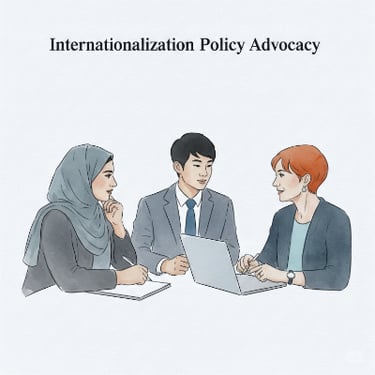

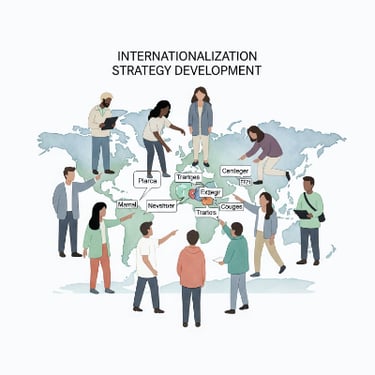

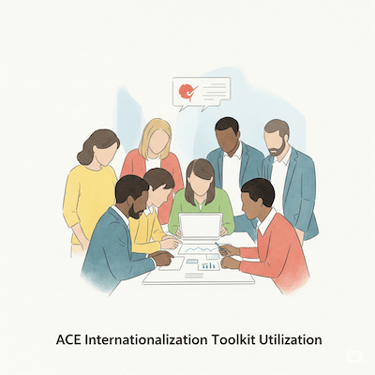







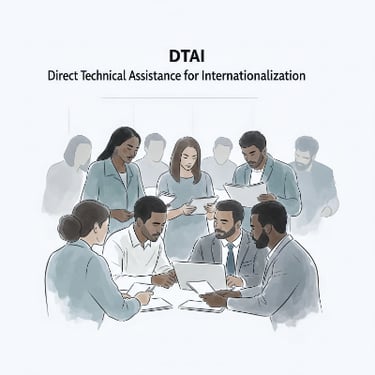











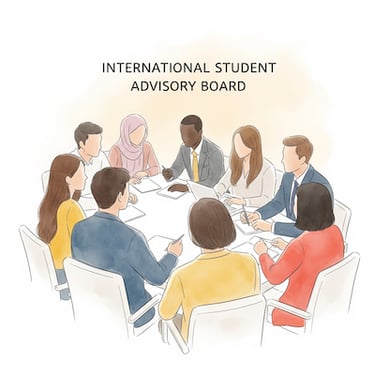

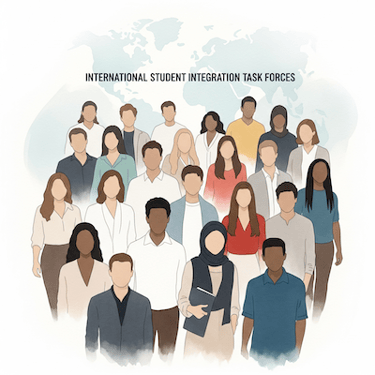

Capacity Building
Academics Without Borders (AWB) Initiatives
Definition: A non-profit organization supporting capacity-building projects in higher education in low and middle-income countries by sending volunteer academic experts to enhance teaching, research, and administrative operations.
Benefits: Enhances institutional capacity, promotes knowledge exchange, and fosters sustainable development.
Impacts: Strengthens higher education systems, supports local expertise development, and elevates global academic collaboration.
Country Related: Global (focus on low and middle-income countries, e.g., Uganda, Ethiopia, Kenya, Indonesia, Colombia)
African Virtual University (AVU) Content Networks
Definition: A pan-African network delivering open-distance and eLearning programs to increase access to higher education in Africa.
Benefits: Enhances access, promotes equity, and fosters digital education.
Impacts: Strengthens African education systems, supports inclusivity, and boosts continental learning opportunities.
Country Related: Pan-African
BRI Partnership Coordination Systems
Definition: Systems managing partnerships with Belt and Road Initiative countries, such as Peking University’s frameworks, to enhance collaboration.
Benefits: Promotes strategic partnerships, enhances research, and fosters economic ties.
Impacts: Strengthens China’s global influence, supports BRI goals, and elevates institutional networks.
Country Related: China
Global Community Engagement Programs
Definition: Initiatives connecting universities with communities for collaborative projects addressing global issues, such as sustainability.
Benefits: Promotes social impact, fosters engagement, and enhances collaboration.
Impacts: Supports global development goals, strengthens community ties, and elevates institutional impact.
Country Related: Widespread International Practice
Global Ranking Monitoring Systems
Definition: Systems to track and improve global university rankings, e.g., Shanghai Jiao Tong’s ARWU monitoring.
Benefits: Enhances competitiveness, fosters visibility, and improves strategies.
Impacts: Strengthens China’s global education influence, supports rankings, and elevates reputation.
Country Related: China
Intercultural Leadership Institute
Definition: Programs developing leadership skills for managing diverse global teams, fostering leadership and inclusion.
Benefits: Enhances leadership capacity, promotes collaboration, and fosters intercultural skills.
Impacts: Strengthens global readiness, supports diversity, and elevates institutional leadership.
Country Related: Widespread International Practice
International Partnership Development Workshops
Definition: Training for staff to build skills in managing global partnerships, enhancing institutional collaboration.
Benefits: Improves partnership quality, fosters networks, and enhances efficiency.
Impacts: Strengthens global ties, supports collaboration, and elevates institutional reach.
Country Related: Widespread International Practice
Participation in Global Linguistic University Networks (e.g., Francophonie)
Definition: Engagement in language-based networks (e.g., AUF for French) for mobility, research, and curriculum sharing.
Benefits: Enhances collaboration, promotes cultural ties, and fosters mobility.
Impacts: Strengthens global linguistic networks, supports education, and elevates regional connectivity.
Country Related: Africa (esp. Francophone), Global
Transnational Alliance Governance
Definition: Governance for European University Alliances, e.g., Utrecht University’s EUI systems, ensuring collaboration.
Benefits: Enhances integration, fosters collaboration, and improves outcomes.
Impacts: Strengthens European academic unity, supports alliances, and elevates institutional reach.
Country Related: Europe
Transnational Education (TNE) Hubs / Edu-Cities
Definition: Special zones attracting foreign university campuses, e.g., Malaysia’s education cities, enhancing TNE.
Benefits: Attracts talent, fosters economic growth, and enhances education.
Impacts: Strengthens Malaysia’s global education hub status, supports TNE, and elevates institutional reach.
Country Related: Malaysia


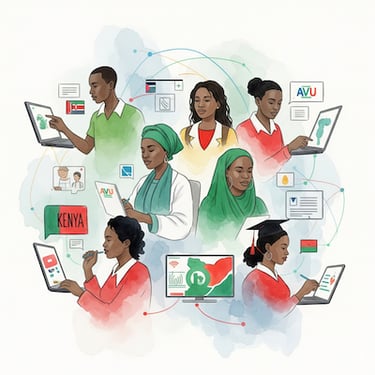



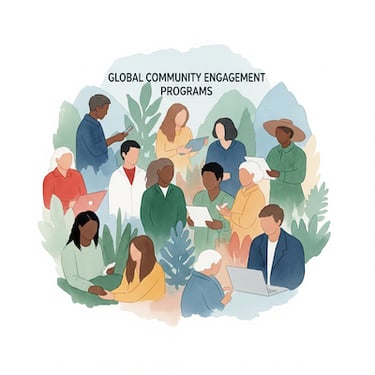



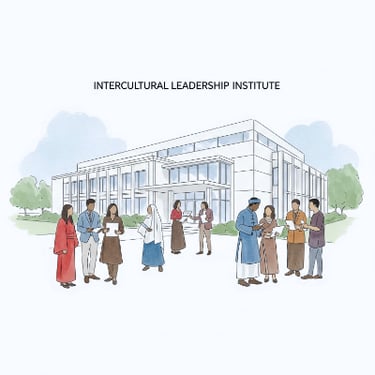



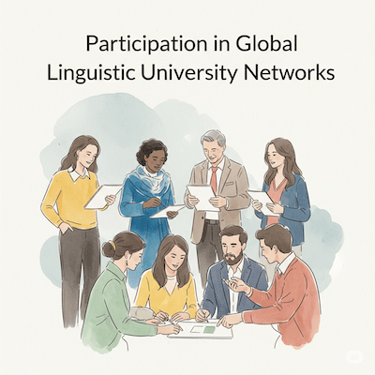

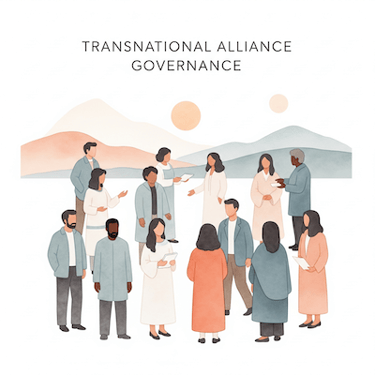



Frameworks
Frameworks allow administrators to explore international initiatives from operational and strategic perspectives.
